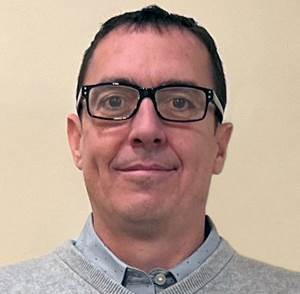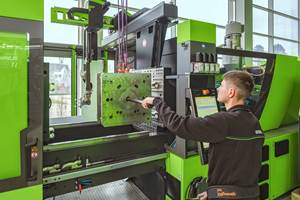‘Skills Gap’ at Processors Means More Needed from Suppliers
Count screen changer manufacturer High-Technology as among those machine builders providing more intuitive and integrated products requiring less in the way of human intervention.
The changing landscape in plastics processing is requiring firms up and down the supply chain to offer systems more fool-proof and intuitive than ever. At NPE2018, you’ll see a lot of this in new control platforms, not only among suppliers of primary processing machinery but in auxiliaries as well.
“On a daily basis we deal with the fact that processors’ central engineering or corporate engineering functions have been substantially reduced if not completely eliminated,” notes Aline Alroy, president of High-Technology Corp, which next year will be celebrating its 50th year in the screen changer business. “The result is that responsibilities once part of the function of project management and long-term corporate planning are now added to the daily job functions of plant personnel. Frequently, our customers’ plant personnel are working in crisis-management mode, putting out their usual daily production fires, and they don’t have the time and/or knowledge to deal with equipment and or component issues.” And Alroy has found that more and more customers fighting the daily fires are requiring suppliers like her company to carry the hose and maybe even supply the water too.
“Over the past decades we have dismantled vocational training in the U.S. The result is a shortage of skilled labor throughout our industry, regardless of geographic location. With the baby boomer-generation transitioning into retirement, the lack of workers qualified or even desiring to step into their positions is an issue that comes up with everyone we talk to: fellow machine builders as well as customers. Constant on-the-job training, constant search for qualified workers and frequent employee turn-over take a toll, not only financially, but on the plant personnel who are also charged with the responsibility of keeping production up and running.”
She continues, “Quite often, customers wishing to retrofit one of our screen changer onto an old extrusion line cannot find the documentation on their existing equipment. In these cases, one of our engineers is available to travel to the customer’s plant to take measurements and obtain the information necessary to move the project forward. We also offer in-plant training for new employees as a result of the frequent turnover in operators and maintenance personnel.”
For Alroy, that’s what makes shows like NPE so invaluable. “It provides an opportunity to meet with processors, discuss technical issues and offer ideas and solutions in a concentrated fashion. As a closely held, family-owned business, we have the freedom to invest in the very long term: with our customers, our employees and in R&D to continuously advance our technology.”
At her NPE2018 exhibit (Booth W4553) High-Technology will be showing some of the fruits of those efforts. “We relentlessly and continuously use our experience with our customers to advance our technology to make it as user-friendly and trouble free as possible,” says Alroy. “With diminished resources at the plant level, equipment today has to perform with as little human intervention as possible. Our latest generation of screen changers: the DR model, represents the culmination of five decades of development resulting in a unit that sets a new industry standard for reliability, performance and ease of trouble shooting. Sophisticated PLC based controls allow for full integration of the screen changer’s operation into the extrusion line’s controls, enabling seamless integration of the filtration function with the entire extrusion process.”
Alroy continues, “Our philosophy is to support our customers in every way possible. A High-Technology employee empowered to offer immediate help answers the phone. We maintain files on every machine we have ever sold. Often, we get calls from new employees who know very little about the equipment they are supposed to be taking care of. We step in immediately, to supply missing documentation, spare parts lists, operating manuals and phone support from one of our engineers.
“Many of our customers who purchased their first screen changer from us in the 1970s and 80s are still using our equipment. We offer a program to remanufacture and upgrade these older units at about half the cost of a new screen changer. Once rebuilt, these units are indistinguishable from a new machine. This enables customers to benefit from technical advances within budgets that are severely constrained.”
Related Content
Blow Molder with a Mission: CKS Packaging Shares Gains Of Its Phenomenal Growth
From three machines in 1986 to 27 plants nationwide today, this family-owned processor has prospered through unwavering customer service, committed employees and dedicated service to its community.
Read MoreGuill Adds Three to Employee Roster
Extrusion tooling maker Guill Tool has recently hired of three new employees.
Read MoreBoise State Team Wins Circular Plastics Challenge Focused On PET Recovery
NPE2024: The competition is a collaboration between Hillenbrand, Net Impact and Coca Cola.
Read MoreMold-Change Time Targeted with Training, Technology
Engel is offering technology and training to molders to help them optimize their mold-changing process.
Read MoreRead Next
Beyond Prototypes: 8 Ways the Plastics Industry Is Using 3D Printing
Plastics processors are finding applications for 3D printing around the plant and across the supply chain. Here are 8 examples to look for at NPE2024.
Read MorePeople 4.0 – How to Get Buy-In from Your Staff for Industry 4.0 Systems
Implementing a production monitoring system as the foundation of a ‘smart factory’ is about integrating people with new technology as much as it is about integrating machines and computers. Here are tips from a company that has gone through the process.
Read MoreMaking the Circular Economy a Reality
Driven by brand owner demands and new worldwide legislation, the entire supply chain is working toward the shift to circularity, with some evidence the circular economy has already begun.
Read More















